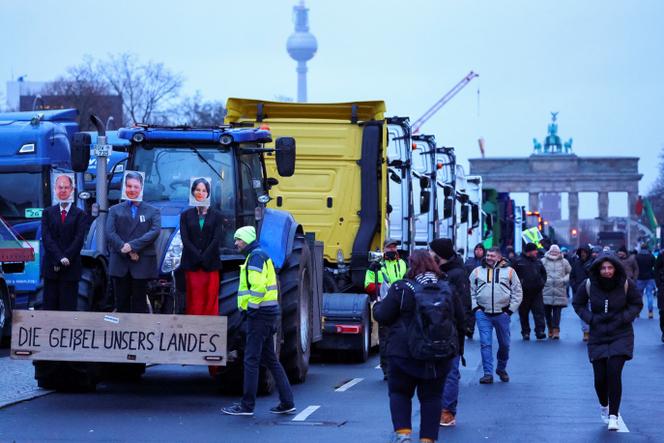


It was Thursday, January 11. For the previous three days, German farmers had been taking action in the field against the government's decision, announced three weeks earlier, to abolish the tax break on off-road diesel fuel. On that particular morning, as tractors blocked freeways across the country, one town made the front page: Cottbus, on the Polish border, where over 1,000 protesters had gathered, despite the polar cold, in front of the national rail company's new maintenance workshop, which was due to be inaugurated by Chancellor Olaf Scholz.
A few meters from the entrance, a man stood out, wearing a green vest and brown hat. This joyful 50-something seemed to know everyone, starting with the journalists from the regional press with whom he conducted one interview after another. Heiko Terno runs a 360-cow dairy farm between Cottbus and Berlin and is vice president of the Brandenburg Farmers' Federation. When asked what he thinks of the government, his answer was blunt: "The big problem is the Greens. How could they be entrusted with the Ministry of Agriculture? These people know nothing about our problems. With the Social Democrats [SPD, Scholz's party] or the Liberals [Finance Minister Christian Lindner's party], we can disagree, but at least we talk. With the Greens, it's impossible, we're dealing with ideologues totally cut off from reality."
Overhearing the political talk, an older man joined in the conversation. A retired textile worker, he wanted to be there to support the farmers. "For them, it's the price of diesel, but for everyone else, it's the same thing: We can't buy anything anymore; in the last two years, all prices have exploded." The culprits were quickly identified: Once again, it was the Greens. "We used to have cheap gas, but under the pretext that we were buying it from the evil Mr. Putin, they turned off the tap. We still had three nuclear power plants, but since they've decreed that nuclear power is worse than Satan, we shut them down just when we were facing an electricity shortage. These people tell us they want to save the planet, but in the meantime, they're ruining Germany and starving the Germans."
The words were harsh, but they reflected the zeitgeist. At the beginning of 2021, the think tank More in Common and the polling institute Kantar asked a representative sample of the German population the question "Do you support the societal movement to protect the environment and combat climate change?" At the time, 68% of respondents answered yes. Two years later, in May 2023, only 34% of those polled answered positively to the same question.
You have 75% of this article left to read. The rest is for subscribers only.
